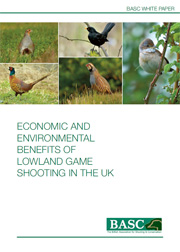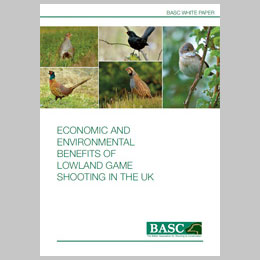 BASC has highlighted the conservation benefits of game shooting for farmland biodiversity following the publication of the 2016 State of Nature report.
BASC has highlighted the conservation benefits of game shooting for farmland biodiversity following the publication of the 2016 State of Nature report.
The report examines the problems facing wildlife in the UK. It suggests that the UK has lost significantly more nature over the long term that the global average. It also suggests the most significant factor is policy-driven agricultural change. But BASC says farmers are not to blame, with many doing a great deal for conservation and wildlife.
Tim Russell, BASC’s director of conservation, said: “As with all reports like this, it is too easy to focus on the negatives and alienate those that are doing good things and benefiting wildlife. Despite these declines, there are areas of hope.
“Lowland game shooting often takes place on farmland. Shooting is involved in the management of two-thirds of the UK’s rural land area and nearly two million hectares are actively managed for conservation as a result of shooting. People who shoot spend 3.9 million work days on conservation – the equivalent of 16,000 full-time jobs. If wildlife is to prosper in the UK, then all areas that contribute to wildlife gain should be recognised.
“Shooting is part of the solution to improving biodiversity. Land managed for shooting is rich in hedgerows, ponds and home to an abundance of plants, butterflies and birds. They are havens for wildlife which otherwise may not have a home.”
Peter Glenser, BASC chairman, said: “Shooting is undeniably a major force for good in many rural areas across the UK. The consequent benefits of land managed for shooting to biodiversity are huge. People who shoot cherish the countryside and take positive steps to help it flourish and grow.”
Earlier this year, BASC produced a white paper, ‘Economic and environmental benefits of lowland game shooting in the UK’ calling on policy makers, government, statutory agencies and conservation NGOs to recognise and support the important role of landscape-scale management for lowland game shooting in providing habitat for threatened farmland birds.
The paper also calls on stakeholders to recognise and support the importance of the voluntary conservation work undertaken by shooters and the positive economic impact their activities can have in rural communities.
BASC’s White Paper outlines a number of benefits including:
- Responsible shooting, carried out in accordance with Codes of Practice, can have significant environmental and economic benefits across the lowland landscape.
- Landscape-scale management for lowland game shooting can be beneficial for a wide variety of native species including plants, butterflies and birds.
- Pest and predator control carried out in support of lowland game shooting helps to protect threatened farmland birds.
- Supplemental feed provided for lowland game can increase the breeding success of farmland songbirds.
